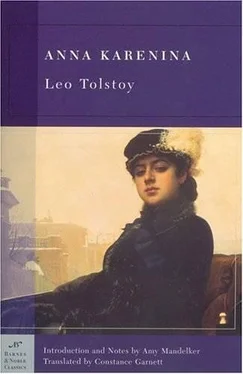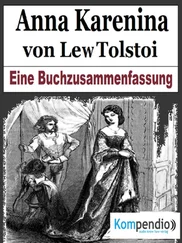Leo Tolstoy - Anna Karenina
Здесь есть возможность читать онлайн «Leo Tolstoy - Anna Karenina» весь текст электронной книги совершенно бесплатно (целиком полную версию без сокращений). В некоторых случаях можно слушать аудио, скачать через торрент в формате fb2 и присутствует краткое содержание. Жанр: Классическая проза, на английском языке. Описание произведения, (предисловие) а так же отзывы посетителей доступны на портале библиотеки ЛибКат.
- Название:Anna Karenina
- Автор:
- Жанр:
- Год:неизвестен
- ISBN:нет данных
- Рейтинг книги:4 / 5. Голосов: 1
-
Избранное:Добавить в избранное
- Отзывы:
-
Ваша оценка:
- 80
- 1
- 2
- 3
- 4
- 5
Anna Karenina: краткое содержание, описание и аннотация
Предлагаем к чтению аннотацию, описание, краткое содержание или предисловие (зависит от того, что написал сам автор книги «Anna Karenina»). Если вы не нашли необходимую информацию о книге — напишите в комментариях, мы постараемся отыскать её.
Anna Karenina — читать онлайн бесплатно полную книгу (весь текст) целиком
Ниже представлен текст книги, разбитый по страницам. Система сохранения места последней прочитанной страницы, позволяет с удобством читать онлайн бесплатно книгу «Anna Karenina», без необходимости каждый раз заново искать на чём Вы остановились. Поставьте закладку, и сможете в любой момент перейти на страницу, на которой закончили чтение.
Интервал:
Закладка:
At Peterburg, as soon as the train stopped and she got out, the first face that attracted her attention was that of her husband. "Oh, my God! What has happened to his ears?" she thought looking at his frigid and imposing figure, and especially the ears, that struck her so now, as they propped up the brim of his round hat. Catching sight of her he went to meet her, pursing his lips into their habitual mocking smile, and fixing her with his big, tired eyes. Some unpleasant sensation contracted her heart as she met his obdurate and tired glance, as though she had expected to see him a different man. She was particularly struck by that feeling of dissatisfaction with herself which she experienced on meeting him. This was an intimate, familiar feeling, like that state of dissimulation which she experienced in her relations with her husband; but hitherto she had not taken note of the feeling; now she was clearly and painfully aware of it.
"Yes, as you see, your tender spouse, as devoted as he was during the second year after marriage, was consumed by the desire of seeing you," he said in his dilatory, high-pitched voice, and in that tone which he almost always used to her- a tone of bantering at anyone who should speak thus in earnest.
"Is Seriozha quite well?" she asked.
"And is this all the reward," said he, "for my ardor? He's well- quite well…"
XXXI
Vronsky had not even attempted to fall asleep all that night. He sat in his armchair, his eyes fixed before him or scanning the people who got in and out, and if he had indeed, on previous occasions, struck and aroused people who did not know him by his air of unshakable calmness, he now seemed prouder and more self-sufficient than ever. He regarded people as if they were things. A nervous young man, a clerk in a law court, who had the seat opposite his, conceived a hatred for him because of this air. The young man asked him for a light, and entered into conversation with him, and even jostled him, to make him feel that he was not a thing, but a man. But Vronsky kept on regarding him as if he were a lamppost, and the young man grimaced, feeling that he was losing his self-possession under the oppressiveness of this refusal to recognize him as a human being.
Vronsky saw nothing and no one. He felt himself a king, not because he believed that he had made any impression on Anna- he did not yet believe that- but because the impression she had made on him afforded him happiness and pride.
What would come of it all he did not know, or even think. He felt that all his forces, hitherto dissolute, scattered, were centered on one thing, and bent with fearful energy toward one blissful goal. And therein lay his happiness. He did but know that he had told her the truth, that he had come where she was, that all the happiness of life, the sole meaning in life for him, now lay in seeing her and hearing her voice. And when he got out of his car at Bologovo to get some seltzer water, and had caught sight of Anna, his very first word had involuntarily told her his very thoughts. And he was glad he had told her, that she knew now, and was thinking of it. He did not sleep all night. Back in his compartment, he incessantly kept ruminating upon every posture in which he had seen her, every word she had uttered; and, in his imagination, making his heart swoon, floated pictures of a possible future.
When he got out of the train at Peterburg, he felt after his sleepless night as lively and fresh as after a cold bath. He paused near his car, waiting for her to emerge. "Once more," he said to himself, smiling unconsciously, "once more I shall see her walk, her face; she may say something, turn her head, glance, smile, perhaps." But before he caught sight of her, he saw her husband, whom the stationmaster was deferentially escorting through the crowd. "Ah, yes. The husband." Only now, for the first time, did Vronsky realize clearly the fact that there was someone attached to her- a husband. He had known that she had a husband, but had hardly believed in his existence, and only now, when he saw him, did he fully believe in him, with his head, and shoulders, and his black-trousered legs; especially when he saw this husband placidly take her arm, with a consciousness of proprietorship.
Seeing Alexei Alexandrovich with his spick-and-span Peterburg face and austerely self-confident figure, in his round hat, with his rather prominent spine, he believed in him, and was aware of a disagreeable sensation, such as might be felt by a man who, tortured by thirst, finds, on reaching a spring, a dog, a sheep or a pig therein that has not only drunk of it, but also muddied the water. Alexei Alexandrovich's manner of walking, gyrating his whole pelvis and his flat feet, was especially offensive to Vronsky. He could recognize in no one but himself an indubitable right to love her. But she was still the same, and the sight of her affected him the same way, physically reviving him, stirring him, and filling his soul with happiness. He told his German valet, who ran up to him from the second class, to take his things and go on, he himself went up to her. He saw the first meeting between the husband and wife, and noted, with a lover's insight, the sign of the slight embarrassment with which she spoke to her husband. "No, she does not love him, and cannot love him," he decided to himself.
At the very moment that he was approaching Anna Arkadyevna from the back, he noticed with joy that she was conscious of his drawing near, and that she looked round; after which, seeing him, she turned again to her husband.
"Have you had a good night?" he said, bowing both to her and to her husband, and leaving it to Alexei Alexandrovich to accept the bow on his own account, and to return it or not, as he might see fit.
"Thank you- a very good one," she answered.
Her face seemed tired, and lacking in that play of animation which usually hovered between her smile and her eyes; but for a single instant, as she glanced at him, something flashed in her eyes, and although this flash died away at once, he was made happy by that moment. She glanced at her husband, to find out whether he knew Vronsky. Alexei Alexandrovich was regarding Vronsky with displeasure, absent-mindedly trying to recall who he was. Vronsky's calmness and self-confidence had here run up, like a scythe against a stone, on the frigid self-confidence of Alexei Alexandrovich.
"Count Vronsky," said Anna.
"Ah! We are acquainted, I believe," said Alexei Alexandrovich apathetically, proffering his hand. "You set out with the mother and return with the son," he said to Anna, articulating distinctly, as though each word were a coin of high value bestowed by him on his hearers.- "You're back from leave, I suppose?" he said, and without waiting for a reply, he addressed his wife in his bantering tone: "Well, were a great many tears shed in Moscow at parting?"
By addressing his wife thus he meant Vronsky to perceive that he wished to be left alone, and, turning slightly toward him, he touched his hat; but Vronsky turned to Anna Arkadyevna:
"I hope to have the honor of calling on you," he said.
Alexei Alexandrovich glanced with his weary eyes at Vronsky.
"Delighted," he said coldly. "We're at home Mondays." Then, dismissing Vronsky entirely, he said to his wife: "I am rather lucky to have just half an hour to meet you, so that I can prove to you my fondness," he went on, in the same bantering tone.
"You lay too great a stress on your fondness for me to value it very much," she responded in the same bantering tone, involuntarily listening to the sound of Vronsky's steps behind them. "But what have I to do with that?" she said to herself, and began questioning her husband as to how Seriozha had got on without her.
"Oh, capitally! Mariette says he has been a very darling boy, and… I must disappoint you… But he has not languished for you as your husband has. But once more merci, my dear, for bestowing a whole day upon me. Our dear Samovar will be enraptured." (He called the Countess Lidia Ivanovna, well known in society, a samovar, because she was bubbling over with excitement on any and every occasion.) "She has been asking for you. And, d'you know, if I may venture to advise you, you ought to go to see her today. You know how she takes everything to heart. Just now, with all her own cares, she's anxious about the reconciliation of the Oblonskys."
Читать дальшеИнтервал:
Закладка:
Похожие книги на «Anna Karenina»
Представляем Вашему вниманию похожие книги на «Anna Karenina» списком для выбора. Мы отобрали схожую по названию и смыслу литературу в надежде предоставить читателям больше вариантов отыскать новые, интересные, ещё непрочитанные произведения.
Обсуждение, отзывы о книге «Anna Karenina» и просто собственные мнения читателей. Оставьте ваши комментарии, напишите, что Вы думаете о произведении, его смысле или главных героях. Укажите что конкретно понравилось, а что нет, и почему Вы так считаете.












